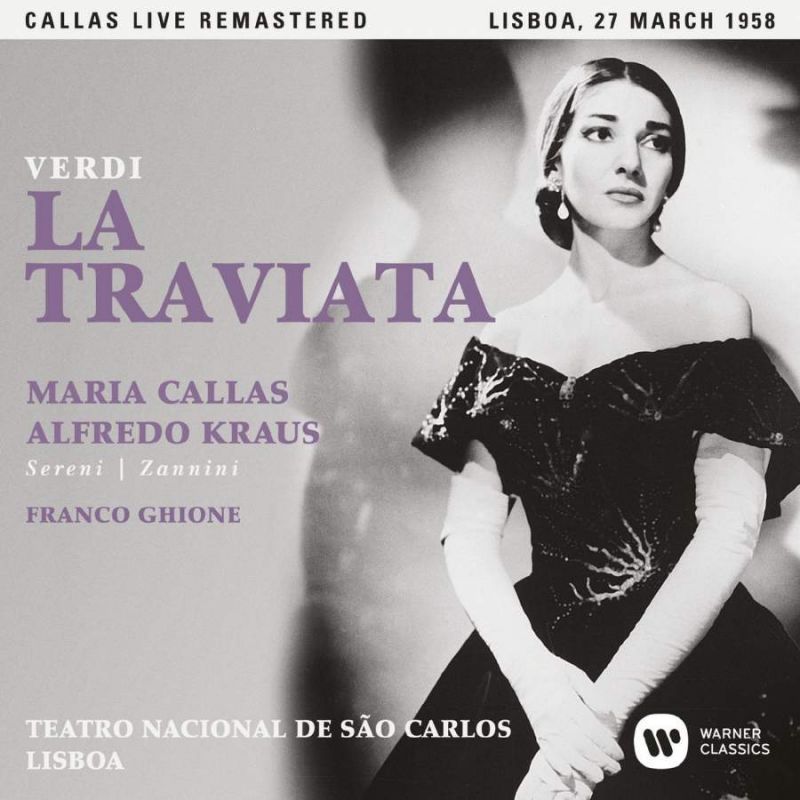Verdi La Traviata
View record and artist detailsRecord and Artist Details
Composer or Director: Giuseppe Verdi
Genre:
Opera
Label: EMI
Magazine Review Date: 11/1987
Media Format: Vinyl
Media Runtime: 0
Mastering:
ADD
Catalogue Number: EX291315-3

Tracks:
| Composition | Artist Credit |
|---|---|
| (La) traviata |
Giuseppe Verdi, Composer
Alessandro Maddalena, Doctor, Bass Alexander Malta, Baron, Baritone Alfredo Kraus, Alfredo Germont, Tenor Franco Ghione, Conductor Giuseppe Verdi, Composer Laura Zannini, Flora, Mezzo soprano Lisbon San Carlos National Theatre Chorus Lisbon San Carlos National Theatre Orchestra Manuel Leitao, Messenger, Bass Maria Callas, Violetta, Soprano Maria Cristina de Castro, Annina, Soprano Mario Sereni, Giorgio Germont, Baritone Piero de Palma, Gastone, Tenor Vito Susca, Marquis, Bass |
Composer or Director: Giuseppe Verdi
Genre:
Opera
Label: EMI
Magazine Review Date: 11/1987
Media Format: CD or Download
Media Runtime: 129
Mastering:
DDD
Catalogue Number: 747538-8

Tracks:
| Composition | Artist Credit |
|---|---|
| (La) traviata |
Giuseppe Verdi, Composer
Alfredo Kraus, Alfredo Germont, Tenor Ambrosian Opera Chorus Christopher Keyte, Messenger, Bass Cynthia Buchan, Annina, Soprano Giuseppe Verdi, Composer Henry Newman, Baron, Baritone Max-René Cosotti, Giuseppe, Tenor Philharmonia Orchestra Renata Scotto, Violetta, Soprano Renato Bruson, Giorgio Germont, Baritone Riccardo Muti, Conductor, Bass Richard Van Allan, Marquis, Bass Roderick Kennedy, Doctor, Bass Royal Marines Band Sarah Walker, Flora, Mezzo soprano Suso Mariategui, Gastone, Tenor |
Composer or Director: Giuseppe Verdi
Genre:
Opera
Label: EMI
Magazine Review Date: 11/1987
Media Format: CD or Download
Media Runtime: 123
Mastering:
ADD
Catalogue Number: 749187-8

Tracks:
| Composition | Artist Credit |
|---|---|
| (La) traviata |
Giuseppe Verdi, Composer
Alessandro Maddalena, Doctor, Bass Alexander Malta, Baron, Baritone Alfredo Kraus, Alfredo Germont, Tenor Franco Ghione, Conductor Giuseppe Verdi, Composer Laura Zannini, Flora, Mezzo soprano Lisbon San Carlos National Theatre Chorus Lisbon San Carlos National Theatre Orchestra Manuel Leitao, Messenger, Bass Maria Callas, Violetta, Soprano Maria Cristina de Castro, Annina, Soprano Mario Sereni, Giorgio Germont, Baritone Piero de Palma, Gastone, Tenor Vito Susca, Marquis, Bass |
Author: Alan Blyth
Then the final act is almost unbearable in its poignancy of expression: the reading of the letter so natural in its feeling of emptiness, the realization that the doctor is lying so truthful, the sense of sheer hollowness at what is possibly the whole opera's most moving moment ''Ma se tornando...'': ''If in returning you have not saved my life, then nothing can save it''. All this and so much else suggests that Callas more than anyone in my experience understood what this role is truly about. Much ot what she achieves here can be heard in embryo on the 1953 Cetra set (LPC1246, 1/58—nla), made before she was quite such a mature artist. No doubt the EMI version that was never recorded would have been technically more perfect: the note at the end of ''Addio del passato'' would have been remade when the singer was fresh, avoiding the frailty encountered here, but then we might have been deprived of this 'official' record of what she sounded like in this part in the theatre. Those of us who heard her at Covent Garden a few months after the performance enshrined here will know that it is a true likeness of those unforgettable readings.
But there is more to it even than that. In my opinion, Alfredo Kraus's Alfredo as heard here is as appealing as any on record. His Schipa-like tone at that stage in his career, his refinement of phrasing, especially in the duets with Callas, and his elegant yet ardent manner are exactly what the role requires. Mario Sereni may not quite be in the class of his colleagues but his Germont pere is securely, sincerely and often perceptively sung and more acutely characterized than in his account of the part with de los Angeles (now available on LP on CfP). Almost as important, contrary to what you may read in some earlier reviews, Franco Ghione is an expert, knowledgeable conductor of this score, yielding to his singers yet prompt and dramatic when need be, and able to draw really singing string tone from his excellent orchestra in the two preludes.
So are there any drawbacks? Yes indeed; the prompter is all too audible, the audience coughs intrusively, particularly during the recitative at the start of Act 3, and the score is extensively cut in the manner traditional to pre-authentic days. If you want to hear it complete you can turn to the Muti/EMI version now encompassed on two CDs. Although this alternative is probably more faithful to Verdi, because of Muti's scrupulous attention to what the composer wanted in terms of notes, tempo and phrasing; it wants the theatrical excitement of the Lisbon performances—and, of course, Callas. Scotto, on her own account, is a mightily affecting Violetta, as I have often stated in these pages, but caught a little late in her career, and latter-day Kraus suffers by comparison with his earlier self. Bruson is a wonderfully stylish Germont. In a sense, you need both versions to have a total picture of what the work has to offer, but if its to be but one Traviata in your collection, it must be the Callas.'
Explore the world’s largest classical music catalogue on Apple Music Classical.
Included with an Apple Music subscription. Download now.

Gramophone Digital Club
- Digital Edition
- Digital Archive
- Reviews Database
- Events & Offers
From £9.20 / month
Subscribe
Gramophone Club
- Print Edition
- Digital Edition
- Digital Archive
- Reviews Database
- Events & Offers
From £11.45 / month
Subscribe
If you are a library, university or other organisation that would be interested in an institutional subscription to Gramophone please click here for further information.






